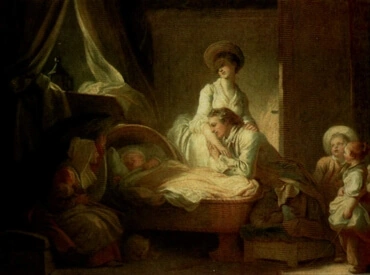1
Följande år, vid den tid då konungarna plägade draga i fält, sände David åstad Joab och med honom sina tjänare och hela Israel; och de härjade Ammons barns land och belägrade Rabba, medan David stannade kvar i Jerusalem.
2
Då hände sig en afton, när David hade stått upp från sitt läger och gick omkring på konungshusets tak, att han från taket fick se en kvinna som badade; och kvinnan var mycket fager att skåda.
3
David sände då åstad och förfrågade sig om kvinnan, och man sade: »Det är Bat-Seba, Eliams dotter, hetiten Urias hustru.»
4
Då sände David några män med uppdrag att hämta henne, och hon kom till honom, och han låg hos henne, när hon hade helgat sig från sin orenhet. Sedan återvände hon hem.
5
Men kvinnan blev havande; hon sände då åstad och lät underrätta David därom och säga: »Jag är havande.»
6
Då sände David till Joab detta bud: »Sänd till mig hetiten Uria.» Så sände då Joab Uria till David.
7
Och när Uria kom till David, frågade denne om det stod väl till med Joab och med folket, och huru kriget gick.
8
Därefter sade David till Uria: »Gå nu ned till ditt hus och två dina fötter.» När då Uria gick ut ur konungens hus, sändes en gåva från konungen efter honom.
9
Men Uria lade sig till vila vid ingången till konungshuset, jämte hans herres alla andra tjänare, och gick icke ned till sitt eget hus.
10
Detta berättade man för David och sade: »Uria har icke gått ned till sitt hus.» Då sade David till Uria: »Du kommer ju från resan; varför har du då icke gått ned till ditt hus?»
11
Uria svarade David: »Arken och Israel och Juda bo nu i lägerhyddor, och min herre Joab och min herres tjänare äro lägrade ute på marken: skulle jag då gå in i mitt hus för att äta och dricka och ligga hos min hustru? Så sant du lever, så sant din själ lever: jag vill icke göra så.»
12
Då sade David till Uria: »Stanna här också i dag, så vill jag i morgon sända dig åstad.» Så stannade då Uria i Jerusalem den dagen och den följande.
13
Och David inbjöd honom till sig och lät honom äta och dricka med sig och gjorde honom drucken. Men om aftonen gick han ut och lade sig på sitt läger tillsammans med sin herres tjänare, och gick icke ned till sitt hus.
14
Följande morgon skrev David ett brev till Joab och sände det med Uria.
15
I brevet skrev han så: »Ställen Uria längst fram, där striden är som häftigast, och dragen eder sedan tillbaka från honom, så att han bliver slagen till döds.»
16
Under belägringen av staden skickade då Joab Uria till den plats där han visste att de tappraste männen funnos.
17
Och männen i staden gjorde ett utfall och gåvo sig i strid med Joab, och flera av folket, av Davids tjänare, föllo; också hetiten Uria dödades.
18
Då sände Joab och lät berätta för David allt vad som hade hänt under striden.
19
Och han bjöd budbäraren och sade: »När du har omtalat för konungen allt vad som har hänt under striden,
20
då upptändes kanske konungens vrede, och han säger till dig: 'Varför gingen I under striden så nära intill staden? Vissten I icke att de skulle skjuta uppifrån muren?
21
Vem var det som slog ihjäl Abimelek, Jerubbesets son? Var det icke en kvinna som kastade en kvarnsten ned på honom från muren, så att han dödades, där i Tebes? Varför gingen I då så nära intill muren?' Men då skall du säga: 'Din tjänare Uria, hetiten, är ock död.'»
22
Budbäraren gick åstad och kom och berättade för David allt vad Joab hade sänt honom att säga;
23
budbäraren sade till David: »Männen blevo oss övermäktiga och drogo ut mot oss på fältet, men vi slogo dem tillbaka ända till stadsporten.
24
Då sköto skyttarna uppifrån muren på dina tjänare, så att flera av konungens tjänare dödades; din tjänare Uria, hetiten, är ock död.»
25
Då sade David till budbäraren: »Så skall du säga till Joab: 'Låt icke detta förtryta dig, ty svärdet förtär än den ene, än den andre; fortsatt med kraft stadens belägring och förstör den.' Och intala honom så mod.»
26
Då nu Urias hustru hörde att hennes man Uria var död, höll hon dödsklagan efter sin man.
27
Och när sorgetiden var förbi, sände David och lät hämta henne hem till sig, och hon blev hans hustru; därefter födde hon honom en son. Men vad David hade gjort misshagade HERREN.







